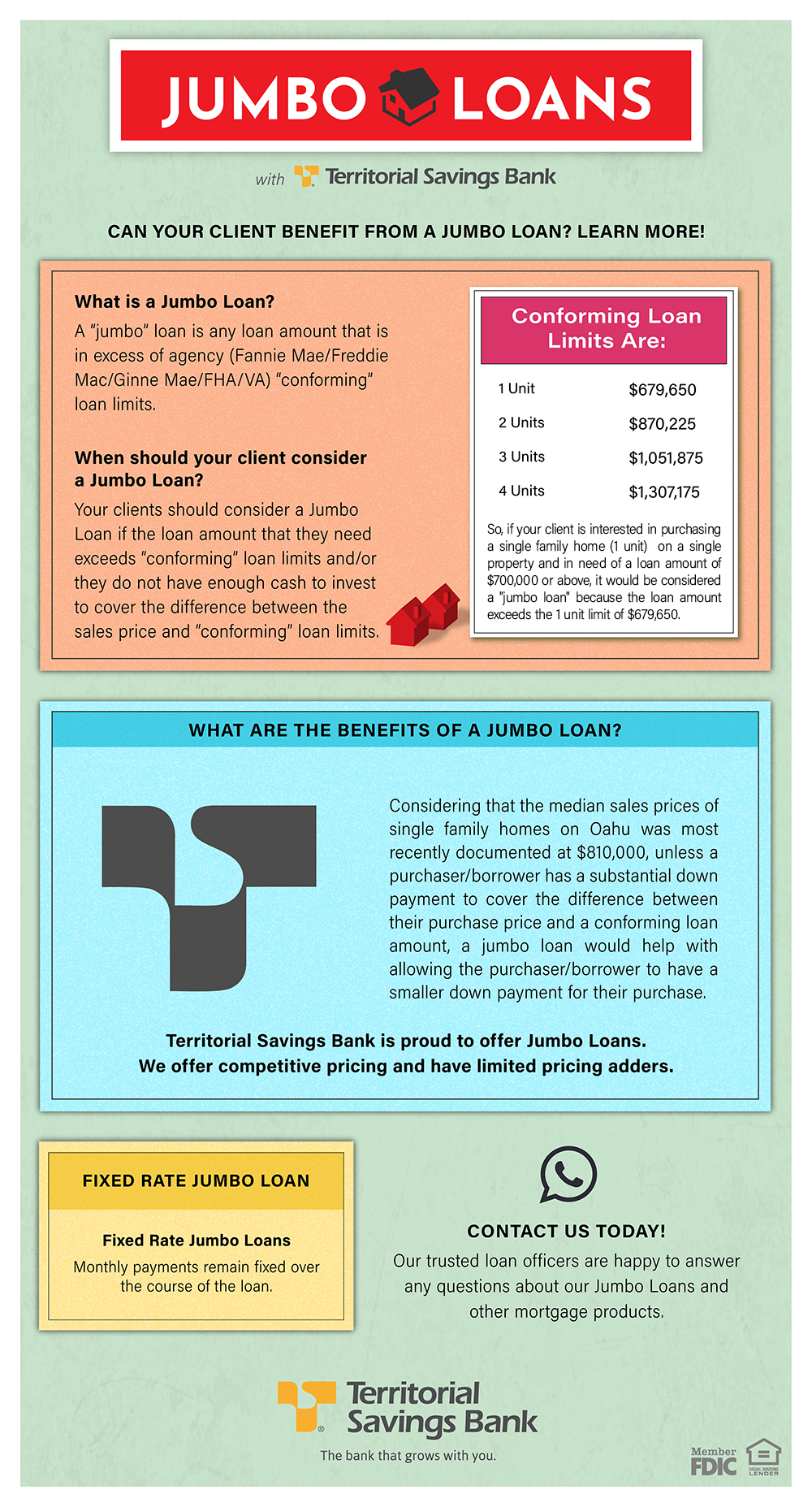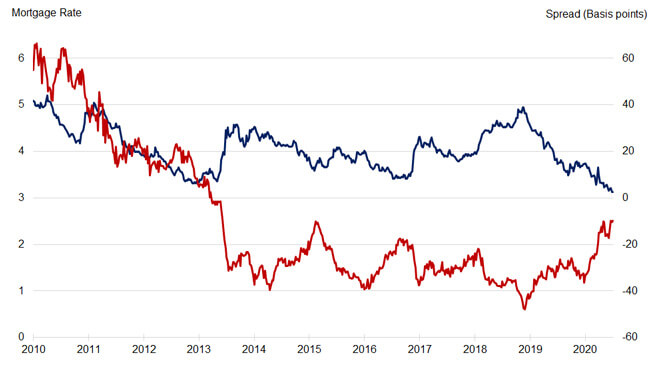Navigating the Jumbo Loan Process: Professional Tips for Getting Your Desire Home
Navigating the Jumbo Loan Process: Professional Tips for Getting Your Desire Home
Blog Article
The Effect of Jumbo Financings on Your Funding Options: What You Need to Know Before Applying
Jumbo lendings can play a pivotal function in forming your funding alternatives, specifically when it concerns obtaining high-value residential properties. While they provide the opportunity for bigger funding amounts without the problem of exclusive home mortgage insurance coverage (PMI), they likewise include rigid credentials criteria that call for careful factor to consider. Understanding the balance in between the difficulties and benefits posed by these loans is important for prospective borrowers. As you consider your options, the effects of interest rates and item schedule might prompt you to reassess your economic strategy progressing (jumbo loan).
Comprehending Jumbo Finances
Comprehending Jumbo Loans needs a clear grasp of their one-of-a-kind characteristics and requirements. Big finances are a sort of home loan that surpasses the adjusting loan restrictions developed by the Federal Housing Finance Agency (FHFA) These restrictions differ by location however commonly cap at $647,200 in the majority of areas, making big fundings crucial for financing higher-priced residential or commercial properties.
Among the defining attributes of jumbo car loans is that they are not eligible for acquisition by Fannie Mae or Freddie Mac, which results in stricter underwriting guidelines. Consumers must usually show a higher credit rating, normally above 700, and offer substantial paperwork of revenue and assets. Furthermore, lenders might call for a larger deposit-- often 20% or more-- to alleviate danger.
Interest rates on jumbo finances can be slightly more than those for conforming financings due to the enhanced risk assumed by the lender. The lack of exclusive mortgage insurance (PMI) can offset some of these expenses. Recognizing these variables is essential for potential consumers, as they considerably influence the terms and usefulness of protecting a big car loan in today's competitive actual estate market.
Advantages of Jumbo Fundings
Jumbo fundings use unique advantages for homebuyers seeking to purchase high-value residential or commercial properties that exceed standard funding limitations. One of the key benefits of jumbo finances is their ability to finance larger quantities, allowing buyers to acquire homes in costs markets without the restrictions enforced by conforming funding limitations - jumbo loan. This versatility makes it possible for homebuyers to see a wider variety of buildings that might much better match their choices and needs
Furthermore, jumbo financings frequently come with competitive passion prices, specifically for consumers with solid credit scores profiles. This can lead to substantial savings over the life of the loan, making homeownership more budget-friendly over time. Jumbo loans can be tailored to match individual economic circumstances, supplying various terms and amortization options that line up with the consumer's objectives.

Obstacles of Jumbo Finances
Navigating the intricacies of jumbo lendings offers several difficulties that possible customers need to be mindful of before continuing. Unlike adapting car loans, jumbo lendings are not backed by government-sponsored business, leading lending institutions to take on even more strenuous criteria.
Furthermore, jumbo finances usually come with greater interest rates compared to traditional financings. This elevated price can considerably affect month-to-month settlements and overall affordability, making it vital for debtors to very carefully analyze their financial situation. The down payment requirements for jumbo fundings can be considerable, commonly ranging from 10% to 20% or more, which can be a barrier for many possible property owners.
Another difficulty more information depends on the minimal availability of jumbo loan items, as not all loan providers use them. This can lead to a decreased swimming pool of alternatives, making it crucial for borrowers to perform thorough research and potentially look for specialized lending institutions. In general, comprehending these obstacles is essential for any person taking into consideration a jumbo funding, as it makes certain educated decision-making and far better economic preparation.
Qualification Criteria
For those considering a jumbo lending, satisfying the qualification requirements is an essential action in the application procedure. Unlike standard loans, jumbo loans are not backed by federal government firms, causing more stringent demands.
First of all, a solid debt rating is necessary; most lenders require a minimum rating of 700. A greater score not only raises your opportunities of authorization yet might also protect better rates of interest. Additionally, consumers are generally expected to demonstrate a significant income to guarantee they can pleasantly handle greater regular monthly settlements. A debt-to-income (DTI) ratio listed below 43% is generally favored, with lower ratios being a lot more positive.
Deposit needs for jumbo lendings are additionally significant. Borrowers must anticipate taking down a minimum of 20% of the building's purchase rate, although some lenders may supply choices as reduced as 10%. Demonstrating cash money books is critical; loan providers commonly call for proof of enough liquid possessions to cover numerous months' well worth of home mortgage payments.
Comparing Financing Choices
When reviewing funding options for high-value residential or commercial properties, understanding the distinctions between various loan types is essential. Big finances, which exceed conforming lending restrictions, commonly featured stricter certifications and higher rates of interest than traditional loans. These lendings are not backed by government-sponsored enterprises, which increases the lender's risk and can lead to extra rigorous underwriting requirements.
On the other hand, standard lendings provide even more versatility and are typically much easier to get for debtors with solid debt accounts. They may come with reduced rate of interest and a wider selection of choices, such as repaired or adjustable-rate mortgages. In addition, government-backed financings, like FHA or VA finances, offer chances for lower down payments and even more lax credit scores requirements, though they likewise use this link impose restrictions on the funding amounts.

Conclusion
In conclusion, jumbo loans present both opportunities and challenges for potential buyers looking for funding for high-value homes. While these finances enable bigger quantities without the worry of exclusive home mortgage insurance coverage, they feature rigorous credentials demands and potential downsides such as greater passion prices. A comprehensive understanding of the difficulties and benefits connected with jumbo financings is essential for making informed choices that line up with long-lasting monetary goals and objectives in the property market.

Report this page